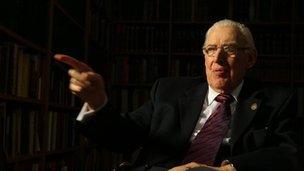Why Ian Paisley is still box office - five and a half years after stepping down from politics
- Published
- comments

The 87-year-old has been one of the most controversial political figures of the 20th Century
It may be five and a half years since Ian Paisley stood down as Stormont's first minister, but there is no doubt the 'Big Man' is still box office.
Watching him in conversation with Eamonn Mallie for Monday night's BBC documentary Paisley: Genesis to Revelation remains spellbinding, as the ex-DUP leader treats us to his full range from charming humour, through to belligerent defence of the apparently indefensible.
His account of his long career from a preacher in gospel mission halls to the dominant unionist leader is punctuated by Eamonn Mallie reminding him of a string of extreme utterances - some Lord Bannside defends, others he has trouble recalling.
There is acknowledgment that the old unionist failure to distribute housing fairly and the practice of gerrymandering councils was wrong.
The former first minister also backs David Cameron's apology over the Bloody Sunday shootings.
However there is no backing away from his role in setting up the paramilitary Third Force and a jaw-dropping comment on the UVF Dublin and Monaghan bombings, in which Lord Bannside says the political leaders of the Irish Republic "brought it on themselves".
The sense in which Ian Paisley can be considered as much an Ulster nationalist as a unionist is conveyed by his contempt for most of the British secretaries of state he dealt with.
Ripples
John Major might not be impressed by Lord Bannside's description of the mortar attack on his cabinet as they sat inside Downing Street as "a cracker for the IRA".
The second Eamonn Mallie programme may cause more ripples for contemporary politics as Ian Paisley expands on his resignation as DUP leader and removal as Free Presbyterian moderator - developments which he refers to in Monday night's programme as being "kicked in the gutter" and "chased out of the church".
However, there is much to ponder in this first programme, including hints at tensions behind the scenes with Peter Robinson whose notorious Clontibret "incursion" - in Paisley's view - should not have occurred.
At one point, whilst watching the young Paisley protesting about flags (an Irish tricolour on the Falls Road) and leading marches though the centre of Belfast, I wondered which contemporary firebrand might be regaling us with his (or her) memoirs in another 40 years time.
We'll have to wait and see, but to watch Ian Paisley you don't have long to wait - the documentary is on BBC1 Northern Ireland at 10.30 pm on Monday night.